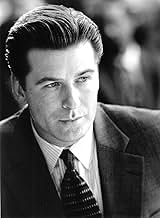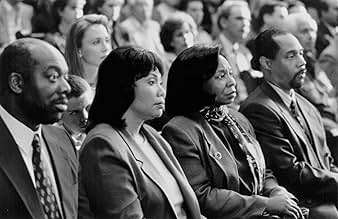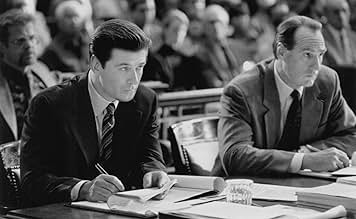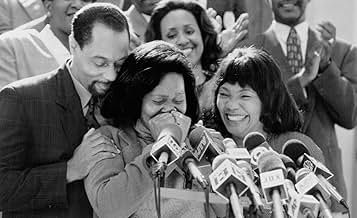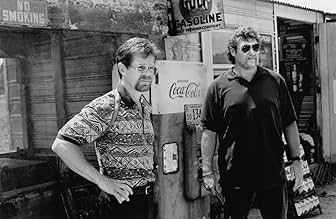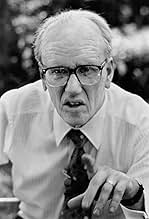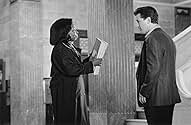IMDb रेटिंग
6.7/10
13 हज़ार
आपकी रेटिंग
अपनी भाषा में प्लॉट जोड़ेंA Mississippi district attorney and the widow of Medgar Evers struggle to finally bring a white supremacist to justice for the 1963 murder of the civil rights leader.A Mississippi district attorney and the widow of Medgar Evers struggle to finally bring a white supremacist to justice for the 1963 murder of the civil rights leader.A Mississippi district attorney and the widow of Medgar Evers struggle to finally bring a white supremacist to justice for the 1963 murder of the civil rights leader.
- 2 ऑस्कर के लिए नामांकित
- 2 जीत और कुल 9 नामांकन
Joe Tello
- Drew DeLaughter
- (as Joseph Tello)
Alexa PenaVega
- Claire DeLaughter
- (as Alexa Vega)
Ben Bennett
- Benny Bennett
- (as Lloyd 'Benny' Bennett)
फ़ीचर्ड समीक्षाएं
It may not be the best film about race relations in the South. Mississippi Burning and A Time To Kill have more intensity, but it is still compelling and worth watching for some great performances.
Alec Balwin (Bobby DeLaughter) turned in a fine performance. Personally, I feel it is the best he has ever done.
James Woods was perfect as Byron De La Beckwith. He channeled the venomous hatred and cocky arrogance so familiar in those who were consumed with their self-worth, gained by stomping on others. This performance resulted in an Oscar nomination in a year with many fine performances.
Dixie DeLaughter, played by Virginia Madsen, shows how ingrained racism is in the South, and how difficult, if not impossible, it is for a marriage to survive with a disparity in views, whether it be race or politics.
I also enjoyed seeing Wayne Rogers as Morris Dees, even if it was a small role.
This is an important film that should be seen by all who care about the state of race relations in this country.
It should also be see by all young people so they can see a sign at a gas station saying 22 cents a gallon. Those were the days.
Alec Balwin (Bobby DeLaughter) turned in a fine performance. Personally, I feel it is the best he has ever done.
James Woods was perfect as Byron De La Beckwith. He channeled the venomous hatred and cocky arrogance so familiar in those who were consumed with their self-worth, gained by stomping on others. This performance resulted in an Oscar nomination in a year with many fine performances.
Dixie DeLaughter, played by Virginia Madsen, shows how ingrained racism is in the South, and how difficult, if not impossible, it is for a marriage to survive with a disparity in views, whether it be race or politics.
I also enjoyed seeing Wayne Rogers as Morris Dees, even if it was a small role.
This is an important film that should be seen by all who care about the state of race relations in this country.
It should also be see by all young people so they can see a sign at a gas station saying 22 cents a gallon. Those were the days.
Glossy but highly effective thriller based on the true story of an attempt to bring a racially motivated killer to trial. The film suffers from a certain liberal obviousness: brave, charming white man (who loves his kids) and dignified black widow fight side by side for justice; but it's always compelling, and pertinent too. No magic, then, but a strong story: one of director Rob Reiner's better efforts.
Ghosts of Mississippi is an emotional movie that shows how hateful the human soul can be. It may be quite similar to Mississippi Burning but they both have their place. Ghosts of Mississippi is slightly more political and less violent. It focuses on the fight for justice and the roadblocks faced in controversial high-profile cases.
The sheer effort that was involved to develop a level of tolerance in the South is despicable. Every time I watch a movie where racism is so prevalent it simultaneously boils my blood and breaks my heart. The acting is very good and makes you feel like you are living the story. James Woods does such a good job that you can't help but despise him. Especially since he is portraying a real person and not a two dimensional character.
Don't underestimate the emotional connection you will have to this movie. It will move you and is certainly worth your time.
The sheer effort that was involved to develop a level of tolerance in the South is despicable. Every time I watch a movie where racism is so prevalent it simultaneously boils my blood and breaks my heart. The acting is very good and makes you feel like you are living the story. James Woods does such a good job that you can't help but despise him. Especially since he is portraying a real person and not a two dimensional character.
Don't underestimate the emotional connection you will have to this movie. It will move you and is certainly worth your time.
I've seen this movie several times on the pay channels (the joys of modern television!). Overall the film is pretty good, and doesn't seem to take great license with history, which is refreshing. My only serious beef about this movie is the same as with Mississippi Burning and other films about the civil-rights struggle: Why do all of these movies insist on providing a white male central character, out to do good for the oppressed black people? Why not do this movie from the POV of Evers' widow, or brother? Because the (white male) power structure in Hollywood feels that audiences won't relate to stories without having a WASP in the middle of the action. This is not to minimize Bobby DeLaughter's role in bringing Byron de la Beckwith to justice; it's just to say that DeLaughter came along very late in the overall history of this case.
So, as to be expected, we're shown that DeLaughter braves ostracism, family conflict, and a death threat (probably a lot of them in real life). All very true, but we lose the fact that the Evers family went through all of this and more in 30 years of keeping the flame alive.
There are some good performances in here, especially James Woods, who had to be having a blast playing de la Beckwith, a mental midget and virulent racist in real life too. Baldwin is okay as DeLaughter but as bland as he normally is, even while affecting the Delta accent. Whoopi Goldberg is very good as the contemporary Myrlie Evers Williams, but ridiculous as the young widow in the flashback sequences. She's obviously too old, and it leaves you wondering if they were just too cheap to pay another actress or if Goldberg's ego is so large that she wouldn't allow it. The actor who played Evers' brother is so outstanding in such a small amount of screen time, you have to wonder why they didn't do more with him.
It's not a bad movie by any stretch, and it does give us a chance to see a little of what Medgar Evers was all about. I only wish that the film had been more about Medgar and Myrlie and much less about DeLaughter. As one other reviewer commented, this feels more like a made-for-TV movie than a theatrical release.
So, as to be expected, we're shown that DeLaughter braves ostracism, family conflict, and a death threat (probably a lot of them in real life). All very true, but we lose the fact that the Evers family went through all of this and more in 30 years of keeping the flame alive.
There are some good performances in here, especially James Woods, who had to be having a blast playing de la Beckwith, a mental midget and virulent racist in real life too. Baldwin is okay as DeLaughter but as bland as he normally is, even while affecting the Delta accent. Whoopi Goldberg is very good as the contemporary Myrlie Evers Williams, but ridiculous as the young widow in the flashback sequences. She's obviously too old, and it leaves you wondering if they were just too cheap to pay another actress or if Goldberg's ego is so large that she wouldn't allow it. The actor who played Evers' brother is so outstanding in such a small amount of screen time, you have to wonder why they didn't do more with him.
It's not a bad movie by any stretch, and it does give us a chance to see a little of what Medgar Evers was all about. I only wish that the film had been more about Medgar and Myrlie and much less about DeLaughter. As one other reviewer commented, this feels more like a made-for-TV movie than a theatrical release.
Medgar Evers' tragic murder in Jackson, Mississippi, was overshadowed by the cold-blooded killing of three civil rights workers near Philadelphia, Mississippi, a year later. So too this film has been overshadowed by an earlier movie, "Mississippi Burning," about the Philadelphia homicides. I was even confused by the similar titles and accidentally rented "Ghosts of Mississippi," thinking it to be the earlier film. This is too bad because "Ghosts of Mississippi" is a winner all the way and Medgar Evers' assassination was as significant, if not more so, than the later dastardly acts of hate and malevolence.
Most of my generation remember one of Dylan's early recordings he wrote called "Pawn in the Game" about the Medgar Evers murder in which Dylan asserts that the coward who pulled the trigger and shot the civil rights leader in the back in front of his wife and three children was carrying out what the racist elements in Mississippi and in the nation as a whole had brainwashed the simple mind into executing. That the endemic racism in American was the real perpetrator of the heinous deed which deprived our society of one of its gifted leaders. "Ghosts of Mississippi" concentrates more on the scumbag who squeezed the trigger, played with élan by James Woods, almost a carbon copy of the killer in both speech, mannerisms, and looks.
James Woods is a member of a strong cast led by Whoopi Goldberg as the widow, Myrlie Evers, spending her life seeking a degree of justice for her husband and children. William H. Macy adds much needed humor in the role of Charlie Crisco, a member of the prosecution team. Unfortunately, his part is mainly limited to the middle section of the movie. Why director Rob Reiner and writer Lewis Colick decided to turn Macy's character into a cameo during the latter part of the film is unclear.
A subplot in the film is the growing involvement of prosecutor Bobby DeLaughter (Alec Baldwin) in the case, opening his eyes not only to the past evils of the society in which he lives but also hostile residue left by the civil rights movement in the state. Married to the daughter of one of Mississippi's most racist judges causes him to be blind to much of the injustice prevalent around him. Significantly, his wife is named Dixie (Virginia Madsen). The change that takes place in his character (which also involves a change in wives) as he is drawn deeper into the thirty-year-old case is pinpointed by his inability to continue to sing "Dixie" to his daughter to chase away the ghosts she sees at night. In explaining to her that the song might actually be encouraging the ghosts to reappear in her bedroom, the two opt for "Old McDonald" as a more suitable goodnight song.
Most of my generation remember one of Dylan's early recordings he wrote called "Pawn in the Game" about the Medgar Evers murder in which Dylan asserts that the coward who pulled the trigger and shot the civil rights leader in the back in front of his wife and three children was carrying out what the racist elements in Mississippi and in the nation as a whole had brainwashed the simple mind into executing. That the endemic racism in American was the real perpetrator of the heinous deed which deprived our society of one of its gifted leaders. "Ghosts of Mississippi" concentrates more on the scumbag who squeezed the trigger, played with élan by James Woods, almost a carbon copy of the killer in both speech, mannerisms, and looks.
James Woods is a member of a strong cast led by Whoopi Goldberg as the widow, Myrlie Evers, spending her life seeking a degree of justice for her husband and children. William H. Macy adds much needed humor in the role of Charlie Crisco, a member of the prosecution team. Unfortunately, his part is mainly limited to the middle section of the movie. Why director Rob Reiner and writer Lewis Colick decided to turn Macy's character into a cameo during the latter part of the film is unclear.
A subplot in the film is the growing involvement of prosecutor Bobby DeLaughter (Alec Baldwin) in the case, opening his eyes not only to the past evils of the society in which he lives but also hostile residue left by the civil rights movement in the state. Married to the daughter of one of Mississippi's most racist judges causes him to be blind to much of the injustice prevalent around him. Significantly, his wife is named Dixie (Virginia Madsen). The change that takes place in his character (which also involves a change in wives) as he is drawn deeper into the thirty-year-old case is pinpointed by his inability to continue to sing "Dixie" to his daughter to chase away the ghosts she sees at night. In explaining to her that the song might actually be encouraging the ghosts to reappear in her bedroom, the two opt for "Old McDonald" as a more suitable goodnight song.
क्या आपको पता है
- ट्रिवियाYolanda King, the daughter of civil rights activist Martin Luther King, portrayed Medgar Evers' daughter Reena Evers in this film.
- गूफ़When DeLaughter and his investigators drive up to a gas station, the prices for gas are all under a dollar. When DeLaughter is on the phone to Myrlie Evers standing on the other side of the signs, the prices are all now over a dollar.
- भाव
Myrlie Evers: [quoting Medgar Evers] When you hate, the only person who suffers is you, because most of the people you hate don't know it and the others don't care.
- साउंडट्रैकI Wish I Knew How It Would Feel to Be Free
Music by Billy Taylor
Lyrics by Billy Taylor and Dick Dallas
Performed by Dionne Farris
Courtesy of Columbia Records
By Arrangement with Sony Music Licensing
टॉप पसंद
रेटिंग देने के लिए साइन-इन करें और वैयक्तिकृत सुझावों के लिए वॉचलिस्ट करें
- How long is Ghosts of Mississippi?Alexa द्वारा संचालित
विवरण
बॉक्स ऑफ़िस
- बजट
- $3,60,00,000(अनुमानित)
- US और कनाडा में सकल
- $1,33,23,144
- US और कनाडा में पहले सप्ताह में कुल कमाई
- $1,68,012
- 22 दिस॰ 1996
- दुनिया भर में सकल
- $1,33,23,144
- चलने की अवधि
- 2 घं 10 मि(130 min)
- रंग
- ध्वनि मिश्रण
- पक्ष अनुपात
- 1.85 : 1
इस पेज में योगदान दें
किसी बदलाव का सुझाव दें या अनुपलब्ध कॉन्टेंट जोड़ें


